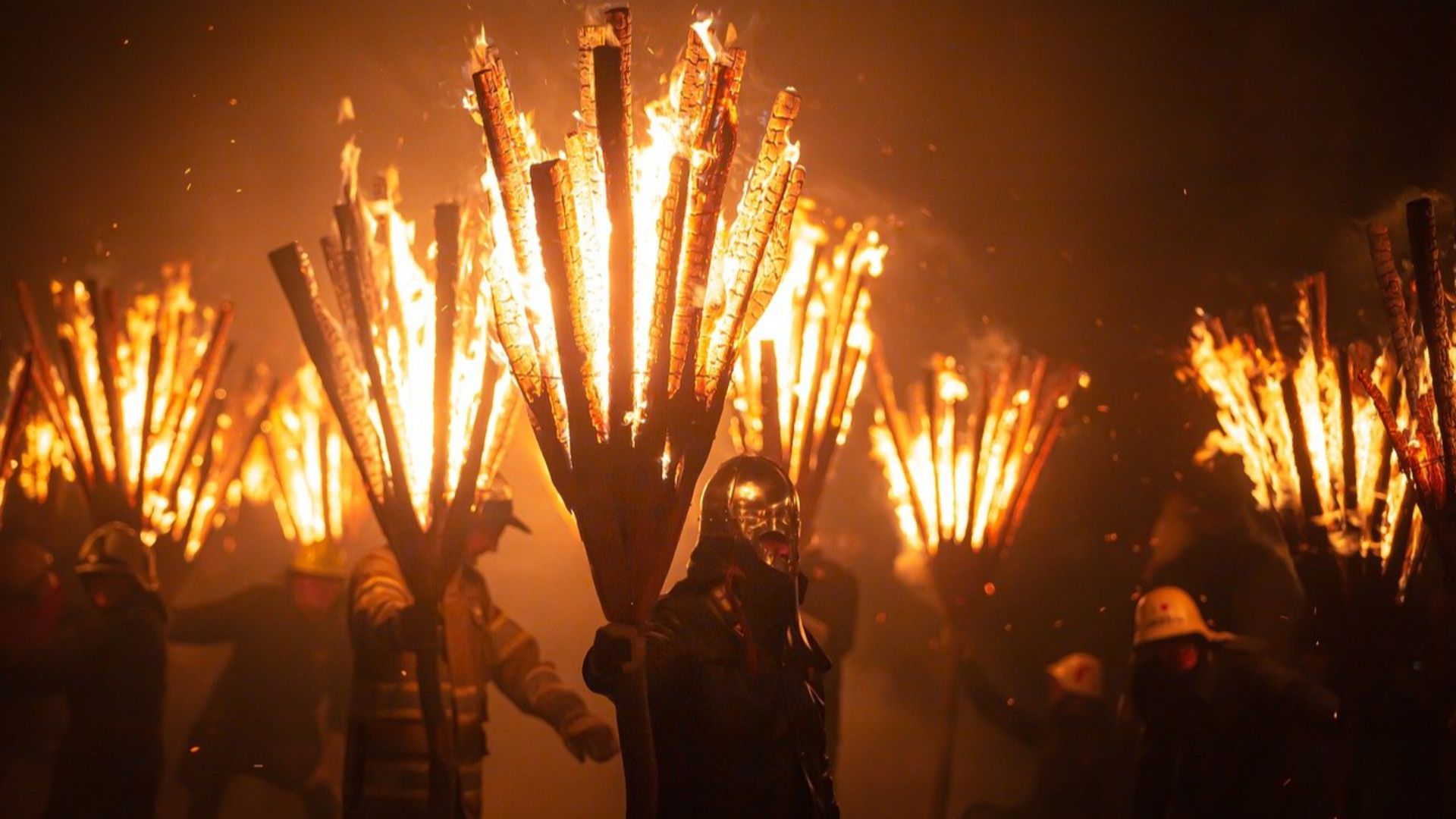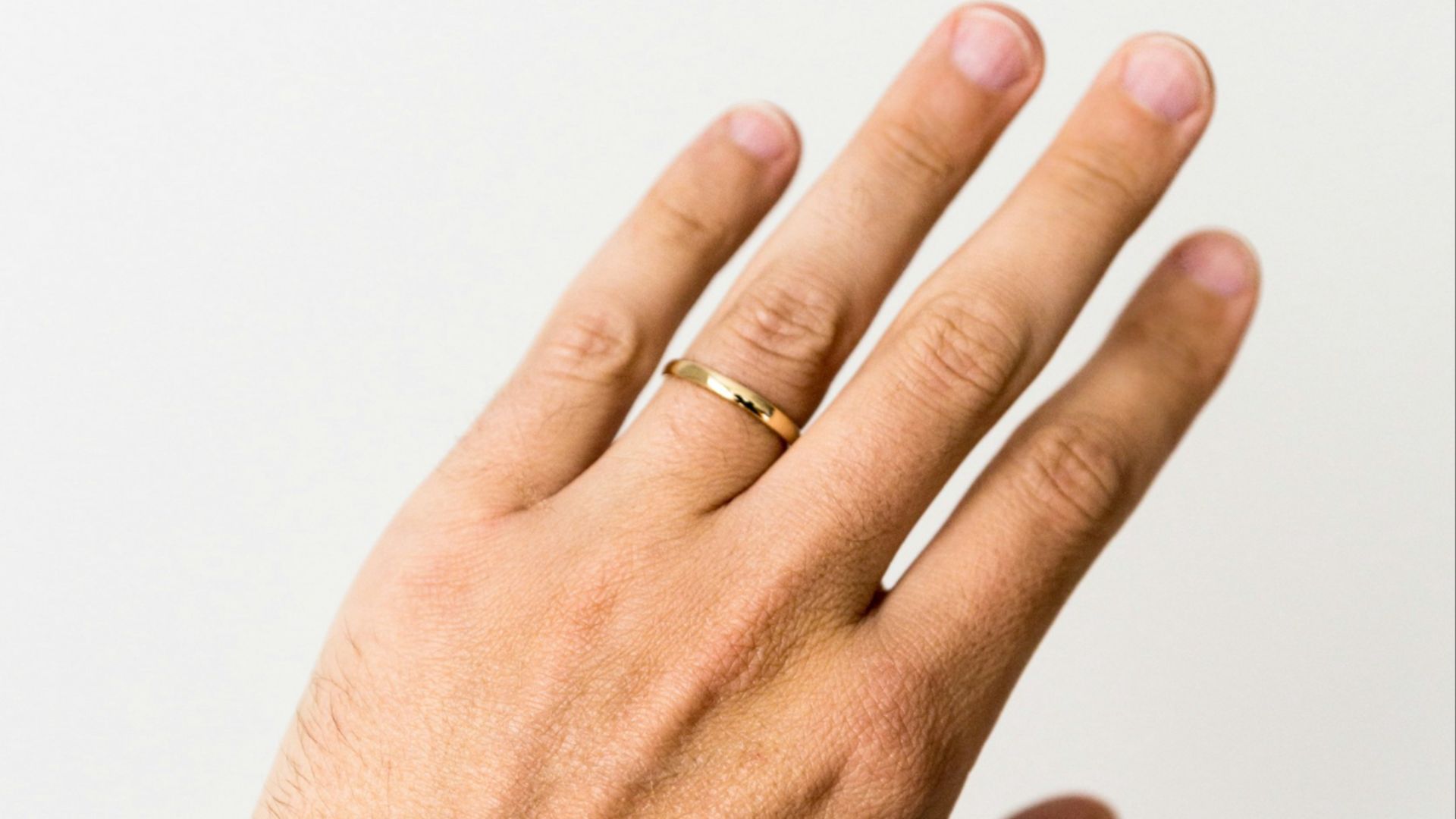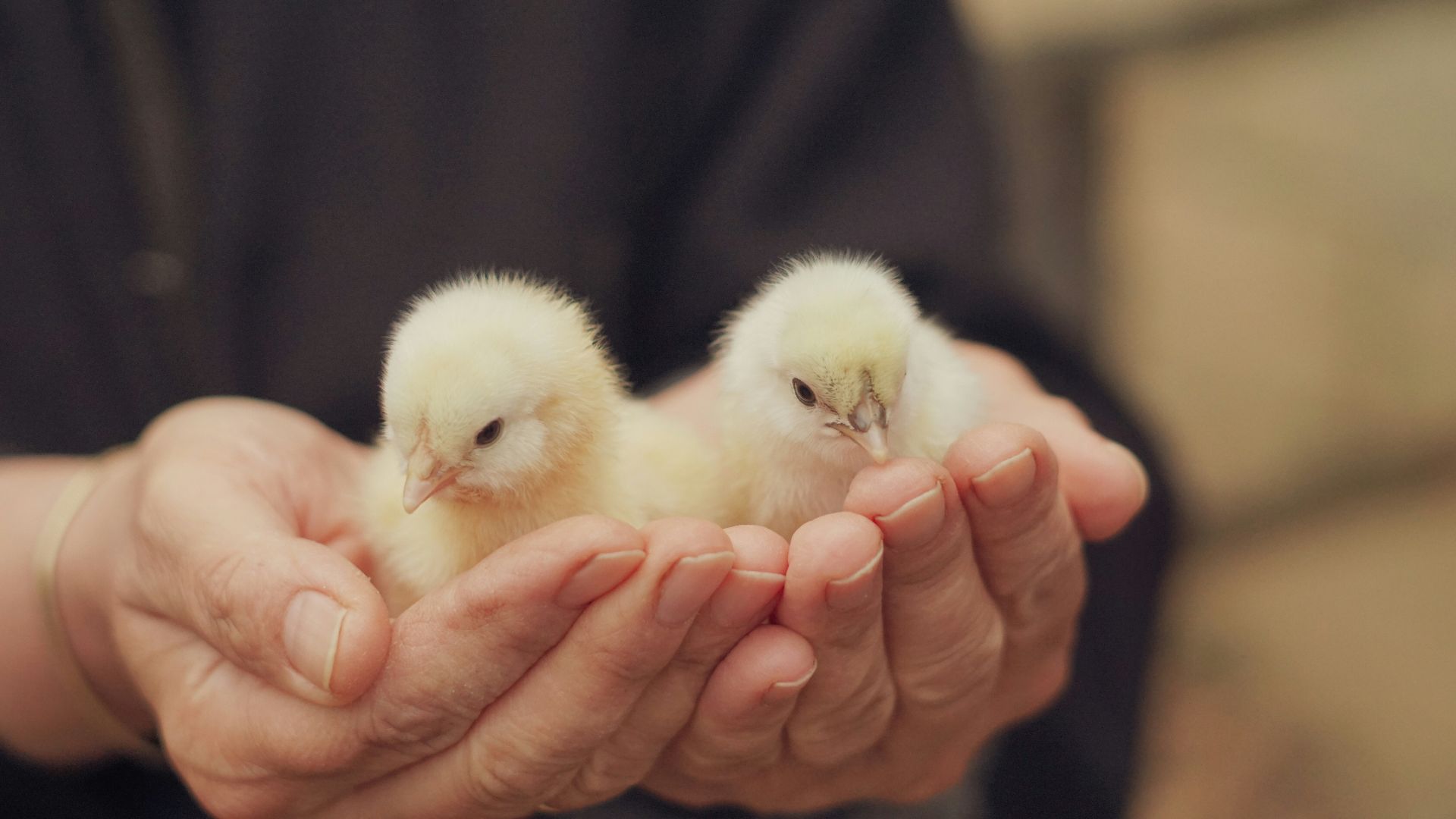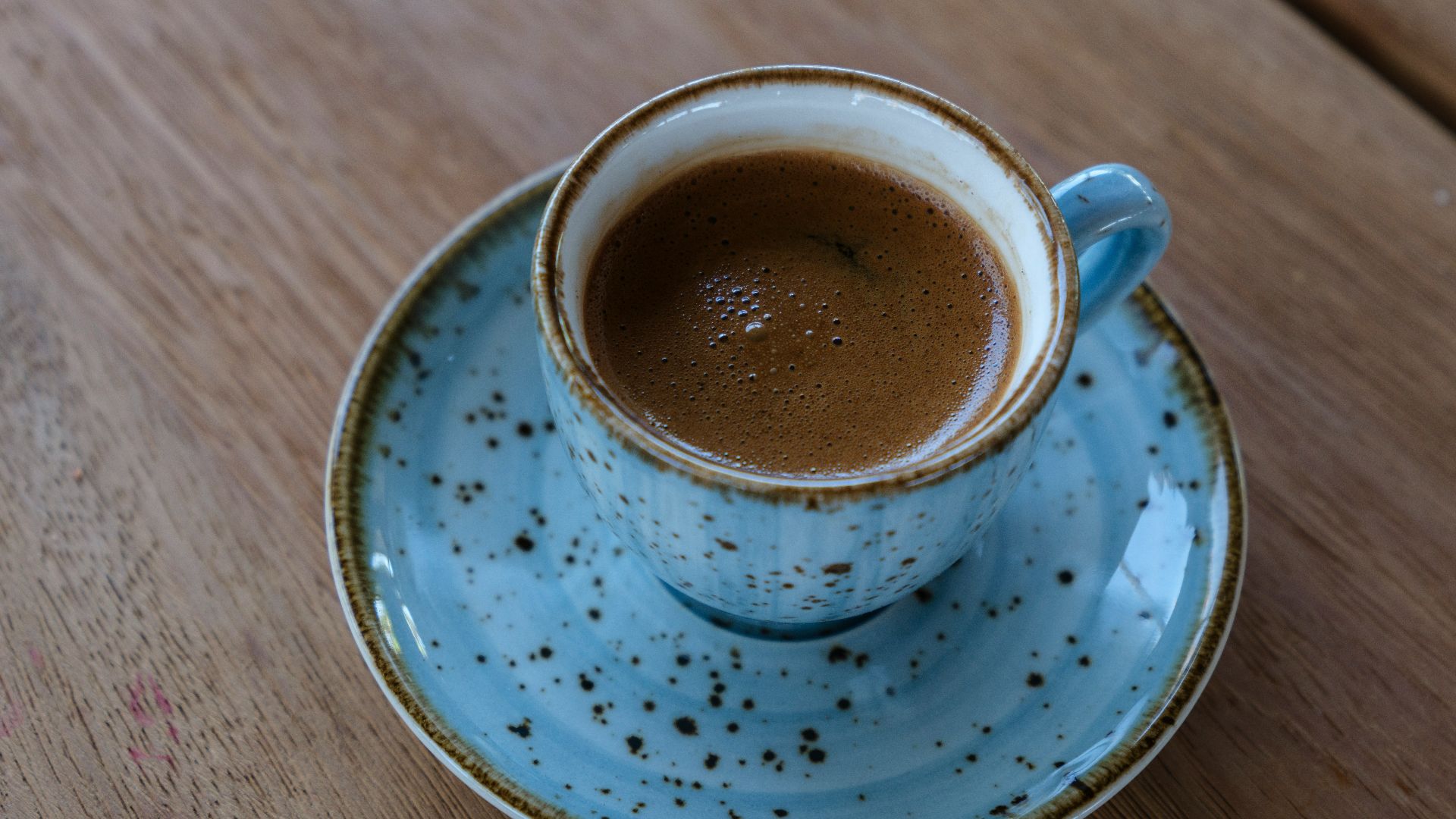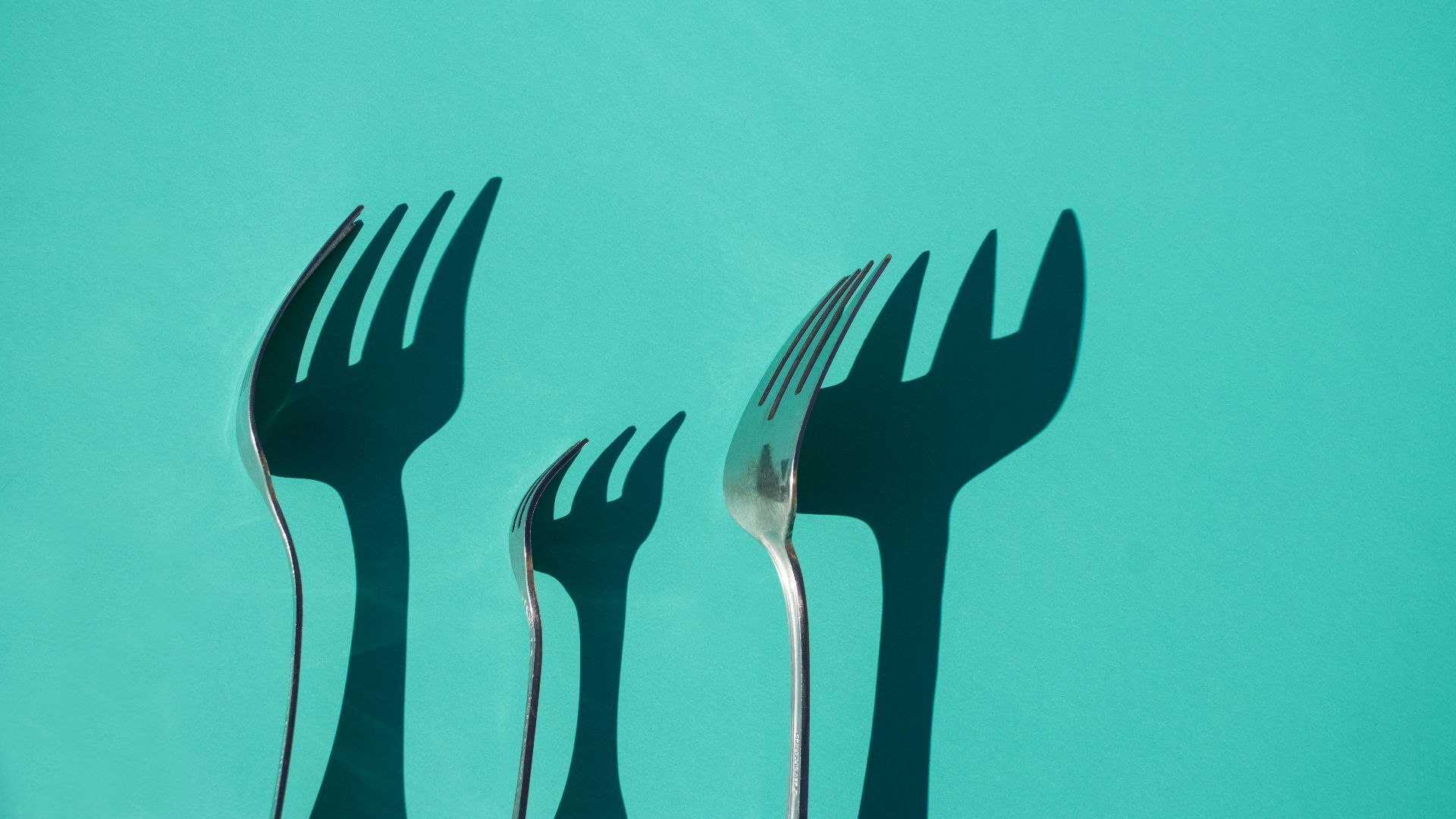Make It Make Sense
What is polite? What is traditional? Well, that depends on what society you're living in. We all abide by many unwritten rules and adhere to customs that might seem unusual or counterintuitive to outsiders. Of course, some are more unusual or counterintuitive than others. Here are 50 unique customs and traditions from around the world that probably make no sense to you or me.
50. Jump For (The Bundle Of) Joy
In North America it's customary to celebrate the birth of a child with a baby shower. Games, snacks, gifts for the new mom. In the Spanish village of Castrillo de Murcia, it's traditional to put newborn babies in the street so that strangers dressed as demons can jump over them.
This ritual, known as El Colacho (baby jumping) is performed every year as part of the festival of Corpus Christi. The jumping is meant to purify the babies of sin, and dates back as early as 1620.
49. Respect For The Dead
In Madagascar, the Malagasy people take respect for dead ancestors to new levels with a ritual known as Famadihana. During Famadihana, people disinter dead relations from family crypts, and rewrap the bodies. Music and dancing ensue as participants parade the bodies around the tombs, and eventually return them to their resting places.
This observance makes the point that the dead are always with us and should never be forgotten.
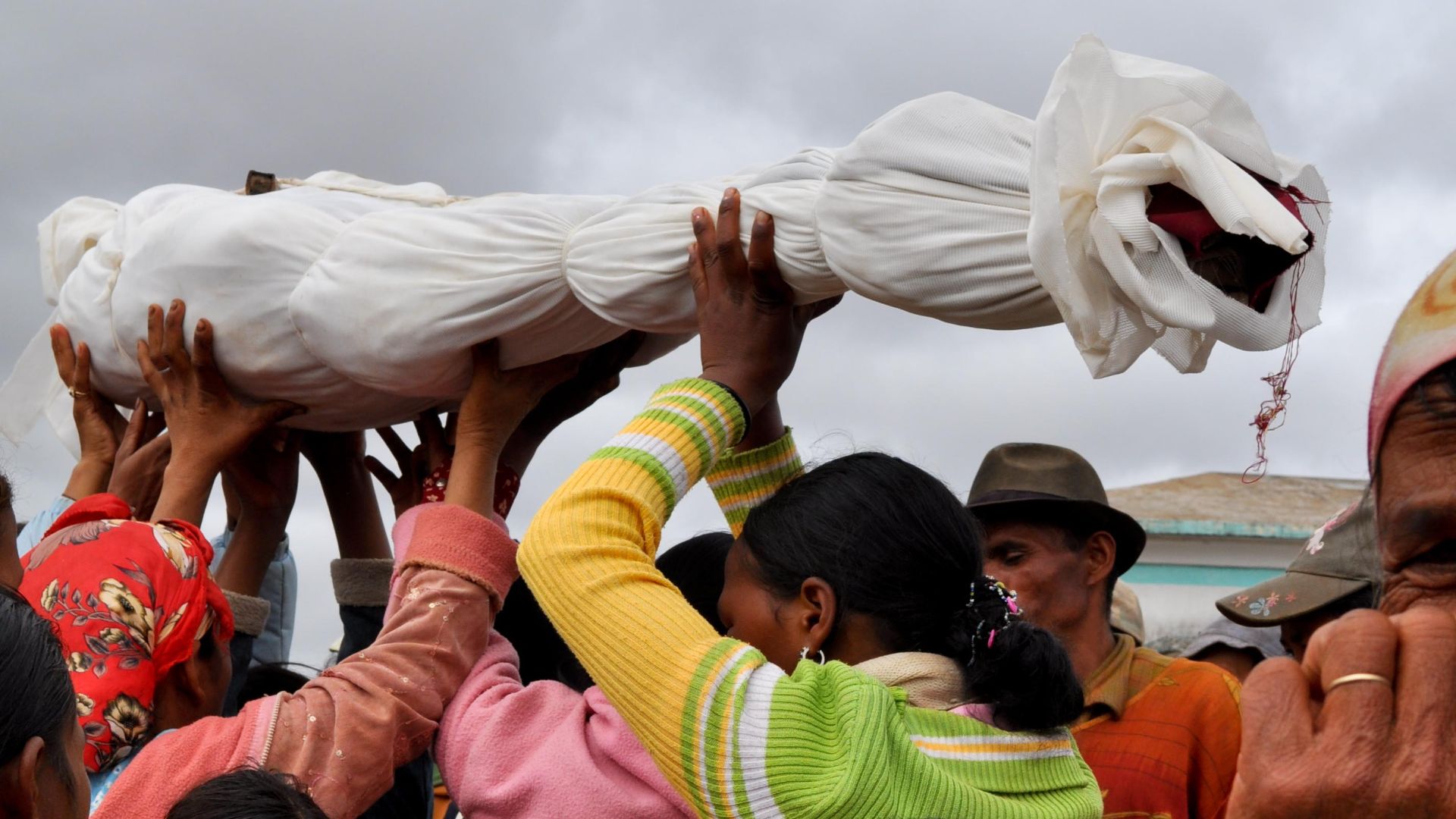 Saveoursmile (Hery Zo Rakotondramanana) on Wikimedia
Saveoursmile (Hery Zo Rakotondramanana) on Wikimedia
48. Alternative To the Tooth Fairy
Instead of putting their lost baby teeth under their pillows in order to get paid, children in Greece instead throw their teeth onto the roofs of their houses and make a wish.
We don't know about you, but we could do without the trouble of fishing teeth out of my eaves trough.
47. Biting The Bullet
Virtually all cultures have initiation rites that celebrate the passage from childhood to adulthood. But the Sateré-Mawé tribe in the northern Amazon of South America have a particularly tough coming-of-age ritual.
In order to attain the status of elder, a young man must stick his hands in a pare of wicker gloves filled with bullet ants and hold them there for at least five minutes. The bite of the bullet ant is famously one of nature's most painful punishments; the species is called bullet because it's said their sting is as painful as being shot.
46. Comfortably Numb
In Fiji, guests are often greeted with a rather unusual drink known as kava. It's made by mixing water with the ground root of a local pepper plant, and has a slightly narcotic effect on those who drink it. Kava also tends to numb the tongue and lips. The taste is generally described as bitter and earthy.
If you're lucky when you visit Fiji, you may be treated to a kava ceremony. The kava is served to guests in order of their perceived status, so if nothing else it's an efficient way to find out where you stand in your friend group.
45. A Rose By Any Name
In Russia, as in most countries, certain flowers have very specific meanings. You should never give someone yellow flowers in Russia, for instance, because that usually symbolizes deceit, betrayal, or a break-up. Similarly, red carnations should never be given to the living. They tend to be associated with graveyards and are therefore an ill omen in any other context.
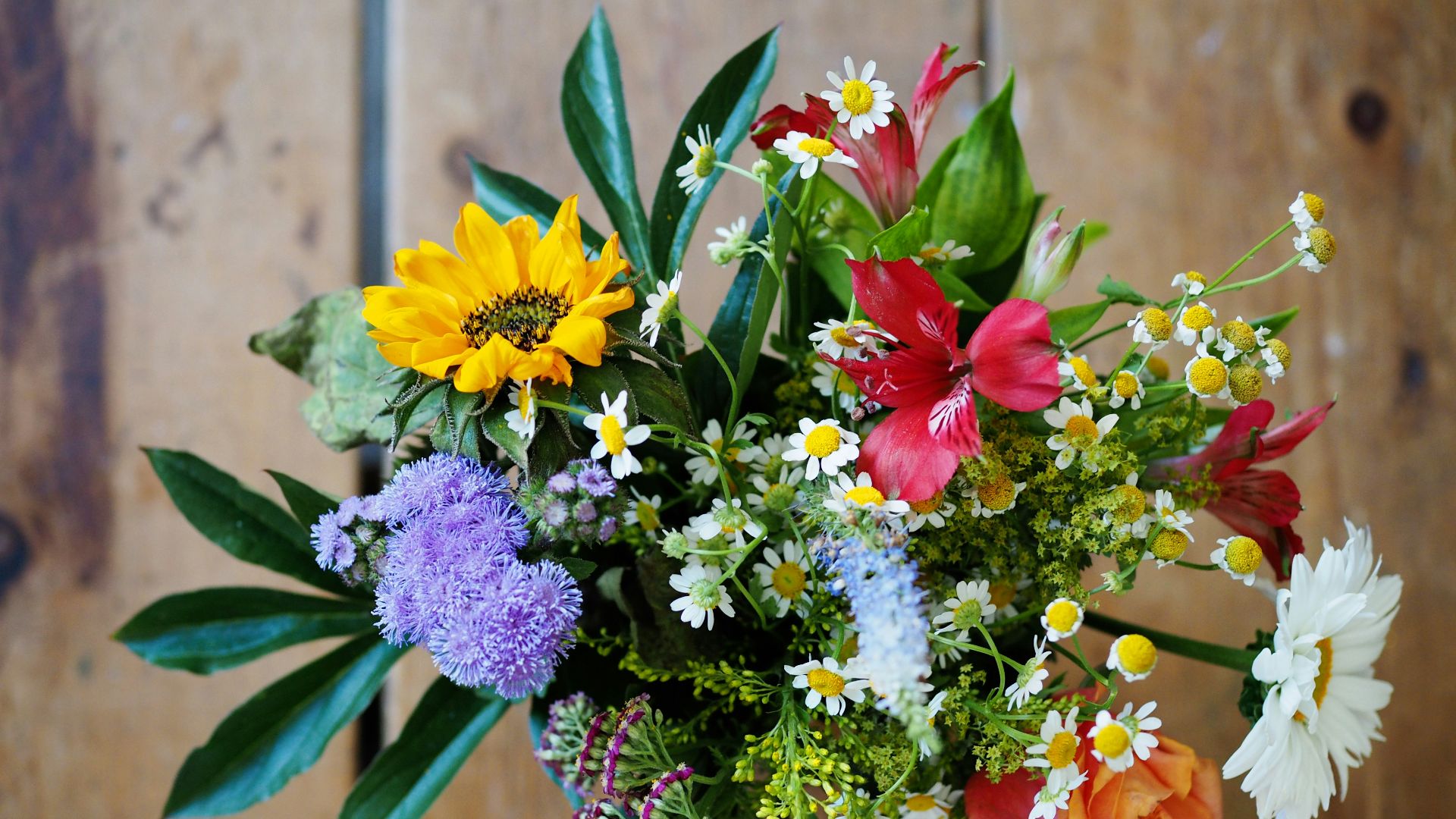 Niklas Ohlrogge (niamoh.de) on Unsplash
Niklas Ohlrogge (niamoh.de) on Unsplash
44. To The Left, To The Left
This custom is surprisingly common -- so common in fact that it's hard to list everywhere it applies.
If you've ever traveled in the developing world, you will be aware that it's very poor form to use your left hand for almost anything in many countries. Don't eat with it, don't shake with it, don't hand something off with it. No, no, no!
The reason is that, in much of the world, the left hand is the one traditionally reserved for wiping. People will therefore react with disgust if you offer than an apple using your south paw.
If you're going to Africa, the Middle East, or Asia, it's seriously worth checking to see how people in your destination country view left-handedness so that you can avoid grossing people out inadvertently.
43. Just Like That Episode of Seinfeld
You know the one, where people start using knives and forks to eat chocolate bars and the like? That's kind of how it is in Norway. Almost everything is eaten with utensils, including hamburgers and sandwiches. When you're done eating, you cross your knife and fork on the plate, making an X. That tells the server that they can take the plate away.
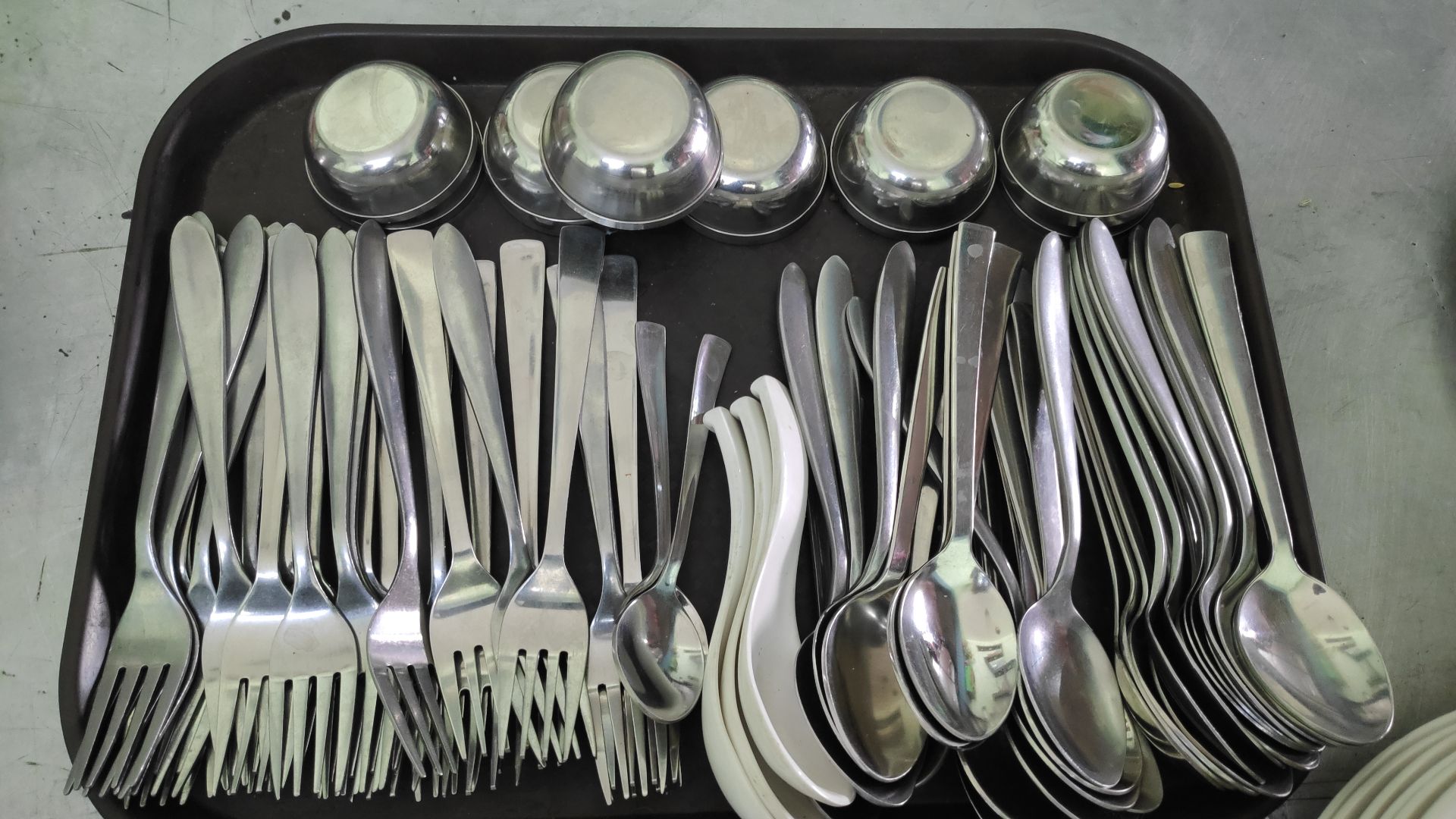 Gaurav Dhwaj Khadka on Wikimedia
Gaurav Dhwaj Khadka on Wikimedia
42. Business Or Pleasure
There's nothing worse than having dinner with someone and all they want to talk about is work.
No country agrees with that sentiment more than Bolivia. In Bolivia, it's socially unacceptable to prattle on about your job at social events, and people will likely let you know about it. Even if you're having a business luncheon, it's best to keep your conversation strictly unprofessional until the other party indicated they're ready to talk turkey.
41. Red Dead Redemption
If you're going to South Korea, it's best to leave your red pens and markers behind. In Korean culture, only the names of the dead are to be written down in red. Writing the name of a living person in red is considered extremely poor form.
40. Get Smashed
The Germans have one of the more peculiar customs when it comes to celebrating impending nuptials. In some parts of Germany, the night before a wedding, family and friends will gather in front of the bride-to-be's house and smash porcelain on the pavement. The couple then clean up the mess together, supposedly teaching them the lesson that team work is indispensable to a happy marriage.
39. Chick Magnet
The Daur people of the Inner Mongolia region of China have an unusual way of choosing wedding dates. According to tradition, the couple must kill a chick and dissect it. The wedding date is then set depending on observations of the chick's liver. Save the date!
38. Uslurpers
If you're from North America, you were probably taught that it is unseemly to slurp when you eat your food. This could not be more untrue in Japan. In fact, if you don't slurp when eating your udon or noodles, people may think you don't like the food. So get those lips a'smackin'!
37. Here Comes The Bride
Apparently, in some parts of rural Scotland, it's traditional for family and friends to throw garbage at engaged couples the week before their wedding. The rationale being, if you can survive a trash bath as a couple, you can survive anything.
36. Spitting Image
The Maasai tribe, who live in Kenya and Tanzania, like to greet each other and express fondness, as we all do. But unlike most folks, they do it by spitting on each other. Spitting on the hands before shaking is thought to bring luck. At weddings, fathers will spit on their daughters' faces and breasts before giving them away for the same reason.
So, if you're visiting... bring an umbrella?
35. Trimming The Fat
The town of Wycombe in the United Kingdom has a peculiar way of keeping its mayor humble. Every year, the mayor is publicly weighed. If he or she has gained weight since the previous year, that is taken as evidence that they've been living high on the hog off tax payer money and everyone boos.
That's one way to encourage politicians to cut out the steak dinners.
34. Bye-ku
For centuries, it has been tradition that literate Japanese people write one last poem on their deathbeds. I'm going to start writing mine now...
33. This One Is Awesome
In Navajo culture, the first time a baby laughs is very special. Whenever this landmark is passed, the family throws a party to celebrate, and the person who made the newborn giggle is traditionally expected to supply the food. That's a fair price to get a laugh, if you ask me.
32. Beat Feet
At Korean weddings, it is traditional to make the husband go through one final trial before he's allowed to take his new bride home. Those in attendance remove his shoes, bind his feet, and beat his feet for a few moments, usually with sticks or dried fish. Often the husband will be peppered with questions while his feet take a walloping.
Supposedly, this is meant to ensure that the husband has sufficient fortitude, though in modern times it's more something wedding guests do for a laugh.
31. Set Your Clocks Accordingly
In Venezuela, it's not only unnecessary to show up exactly on time; it's actually considered uncouth. If you're in Venezuela and someone tells you to meet them at 7 pm, show up at 7:15 to avoid giving offence -- and to avoid just standing around.
30. Salt In The Wound
If you're having dinner with someone in Egypt, never add salt or pepper or any other spice to the dish you're eating. Your host will interpret it as an insult, as though their food were so bad you couldn't possibly eat it without drowning it in seasoning.
 Dubravko Sorić SoraZG on Flickr on Wikimedia
Dubravko Sorić SoraZG on Flickr on Wikimedia
29. Feets Of Strength
In some parts of China, it is traditional for men to carry their pregnant wives over burning coals in order to ease their deliveries. It might just be better to get a c-section.
28. Sad Soup
The Tanomani people of the Amazon (Brazil and Venezuela) don't believe in leaving the bodies of dead friends and relatives to rot. When a member of the community passes away, the body is burned and the remains are mixed into a sort of soup that the mourners then consume.
27. Which Witch?
Paleni Carodejnic is observed in the Czech Republic on the last day of April. It's a ritualistic witch burning. Don't worry: these days they only burn broomsticks and effigies, so it's basically just a bonfire. And, y'know, a gesture to the bad old days when people used to actually burn suspected witches.
26. Black and White
In China, a number of common items are associated with funerals and death: clocks, sandals, handkerchiefs, and white or black objects. So make sure never to give anything that matches those descriptions as a gift to your new friends in China. It will be viewed as horribly gauche.
25. The Lips Don't Lie
Your mother probably taught you it was rude to point when you were a kid. People in Nicaragua agree, but only where hands are concerned. In Nicaragua, it is instead common to point with your lips. Just pucker your lips and move them in the direction of whatever you're trying to point to and people will get your drift.
24. The French Kiss
We all know that Europeans love to kiss hello -- whether you're a long-lost friend or a brand new acquaintance. But in France you really need to research the rules of la bise; they change depending on relationship, gender, and even region. Do you give two? Do you give three? Seriously, do your research on what the rules are in the part of France you're visiting before you arrive.
But wherever you're going in France, avoid hugging people you don't know well. Counterintuitively, the French generally consider hugging more intimate than kissing.
23. The Greatest Holiday Of All Time
If you're in Russia on September 12, you may just get lucky. This is a national holiday called 'the Day of Conception', which was specifically created by the government to encourage Russian couples to have sex and make babies. If you birth a child nine months later, you may even be rewarded by the government! Quite an interesting way to try to keep the population up. Or, y'know, just to have a little fun, since the deed itself is its own reward.
22. Bow To Your Sensei
The Yoruba people live in West Africa, mainly in Nigeria, and they take respect for elders really seriously. So seriously that women are supposed to drop to their knees when greeting elders, and men are expected to lie right down on the ground. Seniority has its privileges.
21. Into The Woods
In Estonia, many people observe a holiday known as Midsummer of Jaanipaev on June 23-24. As part of the celebration, many young couples go into the woods to hunt for fern blossoms. Families will also make bonfires and jump over them.
20. Sweet And Sour
In Denmark, if you're still unwed on your 25th birthday, friends and family will undoubtedly spend the day throwing cinnamon at you. If you don't take the hint and put a ring on someone in the next five years, they're do the same thing again on your 30th birthday, only with pepper instead of cinnamon.
19. The Best Part Of Waking Up
Before a Turkish wedding, it is customary for the bride to surreptitiously place salt in the groom's coffee to see if he'll notice and complain. According to tradition, if he says nothing, he will make a good husband. Or he has a cold. One or the other.
18. A Little Bit Cheesy
When you think of Italian food, one of the things that most likely comes to mind is Parmesan cheese. But in Italy, it's not a good idea to randomly sprinkle Parm on top of every dish. It's generally not done there. Especially if you're eating pizza, your hosts may be offended that you decided to cheese it up. (Italians don't accept Parmesan as a pizza cheese, believe it or not.)
Also, Italians never put cheese on any dish that includes seafood, since they consider the combination of cheese and fish repulsive. It's sort of their equivalent of putting ketchup on steak.
Wait to be asked if you would like some Parm by your server or host lest you give offence.
17. Don't Fork It Up
If you're eating in Thailand and you opt to use a fork, don't use it to stab at your food. That's not done. In Thailand, forks are strictly used to shepherd morsels onto your spoon. If you jab at your food with your fork, people will look at you like you were raised in a pig sty.
16. Some Rules Just Make Sense
In Aboriginal Australian cultures, men are forbidden from ever speaking directly to their mothers-in-law. Tough to say whether this is intended to be a mark of respect for her position or just a way to avoid family fights. Either way, I'm sure there are many American men who wish this custom could be imported!
15. 'Til Death Do Us Meet
In rural China, a bizarre 3,000-year-old tradition is still alive and well. It's called 'ghost marriage', and yes, it's exactly what it sounds like. Families whose children died single will sometimes marry their children post mortum so that they won't have to be alone in the afterlife. There have even been instances of families buying corpses for their deceased sons to marry.
14. Happy Mother's Day
Kids observe Mother's Day in intriguing fashion in Serbia. Traditionally, the youngins sneak into mom's room and tie her feet up with ribbons before she wakes. The idea is that way she won't be able to get out of bed and do any chores on her special day.
13. Whipping boys
Easter in the Czech Republic is a little more... active than you might expect. It is customary for men to whip women (gently) with willow branches in order to ensure fertility and good fortune. The women often respond by giving men either painted eggs or shots -- depending on their age. That's hardly a fair trade, in my book. But who ever said tradition was fair?
12. Christmas piñata
In Catalonia (Spain, sort of), there's a wonderful Christmas tradition called caga tió. A caga tió is a hollow log with a face painted on one end and wooden legs. In the lead-up to the holiday, children care for their caga tiós like they're alive, even going so far as fake feeding them. Then, on Christmas Eve, the kids beat them open with sticks to reveal the presents hidden within.
 Valerie Hinojosa/Flickr Caga tiós.
Valerie Hinojosa/Flickr Caga tiós.
11. Me first, you second
In Korean culture, as in many others, age is greatly revered. So much so that you should never start eating until the eldest person at the table has dug in.
I don't know about you, but if I were an old person in Korea, I would take every chance to make my hungry family wait...
10. Leftovers
In some countries, you will be expected to eat every single crumb that your hosts give you to eat -- or at least, they'll appreciate that and take it as a compliment to the chef. In China, however, you should always leave something behind on the plate. If you don't, your hosts may interpret that as an insinuation that they haven't fed you enough. No one likes being told their larder is lean.
In fact, this rule applies to some Middle Eastern countries as well. In general, it pays to do your etiquette research before traveling.
9. Feast of strength
If you're in Iceland in January and you have a particularly strong stomach, consider attending the festival of Thorri. Around this time, you'll find Icelanders indulging in all of their most... distinctive culinary creations. If you want to try fermented shark meat (and you really don't) this is your best opportunity. Be forewarned: traditional Icelandic food is not for the faint of heart, and the ability to eat it is considered feat of strength.
 Chris 73 / Wikimedia Commons Hakarl, fermented Icelandic shark meat.
Chris 73 / Wikimedia Commons Hakarl, fermented Icelandic shark meat.
8. Cut the cheese
Europe has so much wonderful cheese, but there are all these strings attached! (Pun intended.)
If someone invites you to come eat at their house in France, you can expect them to offer a cheese course. However, there won't be a second. Serving extra helpings of cheese is socially unacceptable; asking for seconds even more so.
7. The foam in Rome
You will no doubt want to get a cappuccino when you're in Italy, but you should make sure you do so in the morning. The cappuccino is strictly a breakfast beverage here. At a bare minimum, people will roll their eyes behind your back if you order one with lunch or -- god forbid! -- after dinner. In some cases, they may actually refuse you or try to talk you out of it. But ordering espresso in the afternoon or evening is perfectly fine.
When in Rome, my pretties...
6. Drinking in Japan
First things first, understand that the Japanese know how to party and you should not try to out-drink them on their home turf. But if you insist on trying, fill your companions' glasses, never your own. Your friends will keep you topped up in turn -- don't doubt that!
The same rules apply in Korea.
5. More money, more problems
In Thailand, you should always be respectful of legal tender. That's because the king's face is on it, and any object bearing the likeness of the monarch should be treated in royal fashion. If you accidentally step on some money, the least you will get is a scolding.
It's important to remember that the Thai people take their royal family very seriously -- almost as seriously as the royals take themselves -- and you should steer clear of any statement or action that could be seen as disrespecting their majesties.
4. Open doors
Shaking hands is perfectly acceptable (indeed, necessary) in Russia. But never do it in a doorway. Always make sure you're all the way inside before you offer a hand. It's considered a bad omen to shake hands on the threshold because that's where the spirit that guards the house resides according to Russian folklore.
3. Thank you for burping
You and I were likely chided for burping loudly as children, but in China, Taiwan, and some other East Asian countries, burping is not only tolerated but encouraged. It's a way of saying, "I am full and I enjoyed my meal." So don't hold back; if anything, try to make sure you do burp!
2. Thank you for farting
Similarly, the Inuit people of Arctic Canada consider it a high compliment if you fart after your meal, and for the same reason. It's just your body saying, "Thanks for the sustenance!"
1. Golden showers
In Brazil, don't be offended if the first thing someone asks when you enter their home is, "Would you like to take a shower?" Brazil is a hot and humid country, so people there shower a lot more than North Americans would consider necessary. We're talking multiple times a day. So if you're offered a chance to clean yourself up, your host isn't trying to tell you you stink; they're just observing the proper etiquette.


